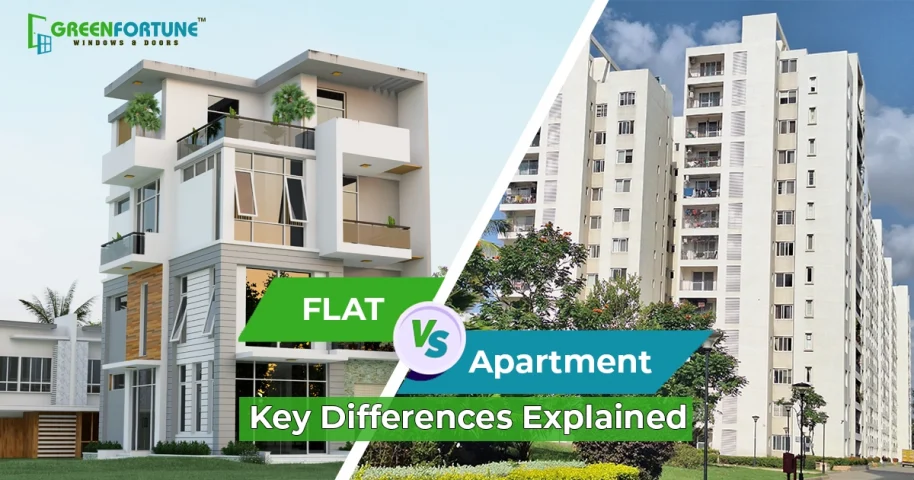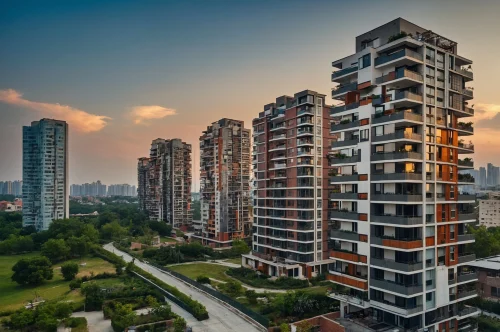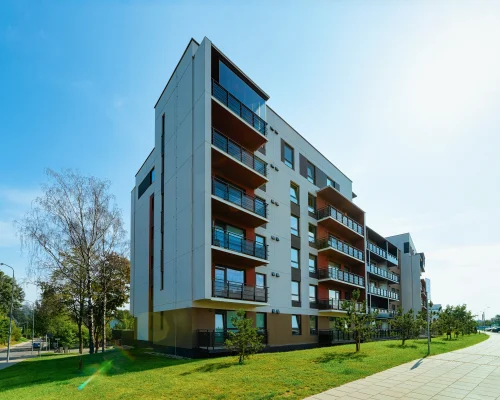
Reshape Your Home with Trendy & Different Types of Door and Windows
April 18, 2025
Ingress And Egress Explained: What They Are & Why They Matter
April 19, 2025To understand the difference between flat and apartments, it's important to start with basic definitions. The terms “flat” and “apartment” are often used interchangeably, especially in global real estate markets. But is there a real difference between a flat and an apartment? Yes, and these differences can influence which option might be more suitable for you.
In this blog, we'll break down the key distinctions, the pros and cons of each, and help you decide which one aligns with your needs.
Table of contents
- What is a Flat?
- What is an Apartment?
- Pros and Cons: Flats vs. Apartments
- Factors to Consider When Choosing Between a Flat and an Apartment
- Comparing Flats and Apartments with Independent Homes
- Legal and Ownership Differences Between Flats and Apartments
- Conclusion: Which One Suits You Best?
- Upgrade Your Home with Green Fortune’s Premium uPVC Solutions
- FAQs
What is a Flat?
In many countries like the UK, India, and other parts of Europe, a “flat” refers to a single-story unit in a residential building.
- Flats are usually part of a larger building structure, and each flat occupies one floor.
- Flats are often simple in design and layout, offering basic living spaces without the extensive amenities found in more luxurious buildings.
- The term "flat in a house" may also be used when a building is divided into multiple residences.
What is an Apartment?
In North America, Canada, and other parts of the world, "apartment" is the preferred term.
- An apartment can refer to a unit in a high-rise building or a residential complex.
- Apartments are generally part of larger complexes and come with shared amenities like gyms, swimming pools, or even concierge services.
- They are usually seen as more modern and upscale compared to flats.
Key Differences: Structure, Amenities, and Ownership
While apartment and flat differences are subtle, they do exist in terms of structure, amenities, and ownership options.
Pros and Cons: Flats vs. Apartments
To further break down the difference between apartment and flat, it's helpful to explore the advantages and disadvantages of each.
Also Read: Maximising Small Spaces: Transforming your Balcony with uPVC Sliding Doors
Factors to Consider When Choosing Between a Flat and an Apartment
The difference between flat and apartments may seem subtle, but there are a few factors to consider when choosing which one suits your needs:
Location:
If you're looking to live in a city’s heart, apartments are likely to be your go-to option due to their availability in high-rise buildings. Flats, on the other hand, might be situated in quieter, residential areas.
Budget:
Flats are more budget-friendly and can provide essential living conditions at a reasonable price. Apartments, though pricier, provide more in terms of amenities and luxury.
Lifestyle:
If you prefer a modern, cosmopolitan lifestyle with access to gyms, pools, and community events, an apartment will likely be a better fit. Flats cater more to those who prioritize simplicity and affordability.
Family Size:
A flat may be an ideal choice for small families or individuals, whereas apartments, especially those with multiple bedrooms, can cater to larger families.
Resale Value:
Apartments often hold their value better due to their location and amenities. However, flats may provide a higher return on investment in local markets where property prices are rising.
Also Read: Different Types of uPVC Doors for Your Home 2025: A Complete Guide
Comparing Flats and Apartments with Independent Homes
In addition to apartment flat comparisons, many potential buyers consider independent homes as another option. Here's a quick comparison:
Independent homes offer more privacy and space, but they come with higher costs and require more personal maintenance.
Legal and Ownership Differences Between Flats and Apartments
A crucial yet often overlooked aspect of the difference between flat and apartments is the legal framework and ownership rights that come with each.
Ownership Rights:
Flats: In many countries, when you buy a flat, you may only own the interior space, with the building structure and land commonly owned by a housing association or cooperative. This can sometimes lead to limitations on making significant changes to the property without collective consent.
Apartments: In contrast, apartments often come with a more defined individual ownership structure, especially in high-end complexes. The purchase typically includes a share of the common areas and, in some cases, rights over the building's land (known as freehold).
Leasehold vs. Freehold:
In the case of flats, the majority are sold under a leasehold agreement, meaning that you only own the flat for a fixed number of years (as per the lease).
Apartments, especially luxury apartments in metropolitan areas, are often sold on a freehold basis, which means you own the property outright, along with a proportionate share in the land on which the building is constructed.
Renovation Rights:
Flats tend to come with more stringent rules about modifications, particularly in older buildings where the structure is shared among several residents. Renovations may need approval from a cooperative or housing association.
Apartments, especially modern ones, allow for more flexibility in terms of renovations, as long as they adhere to building codes and don’t affect shared spaces.
If long-term ownership, legal clarity, and flexibility for changes are important factors for you, apartments may offer more appealing options compared to flats.
Conclusion: Which One Suits You Best?
Choosing between a flat and an apartment ultimately comes down to your lifestyle, budget, and location preferences.
A flat in a house or a residential building may be the best option if you're looking for affordability and simplicity.
On the other hand, if modern amenities, security, and a vibrant community are your priorities, an apartment might be a better fit.
Upgrade Your Home with Green Fortune’s Premium uPVC Solutions
If you're looking for high-quality homes that blend luxury with practicality, explore Green Fortune's range of uPVC solutions.
Whether you choose between flats or apartments, our energy-efficient uPVC windows and doors offer enhanced security, soundproofing, and durability, making them the perfect addition to any home.
Visit Green Fortune to discover how we can elevate your living experience.
FAQs
1. Can flats be converted into apartments?
No, flats and apartments are defined by their building structure and amenities. A flat is typically a single-story unit, while an apartment can be part of a high-rise building with more amenities. Conversion is usually not feasible.
2. Are flats or apartments more common in suburban areas?Flats are generally more common in suburban and older urban areas, while apartments are typically found in newer, high-rise buildings in central urban locations.
3. Do flats have shared facilities like gyms or pools?
Most flats do not offer shared amenities like gyms or pools, as these are more commonly associated with apartment complexes.
4. Which option is better for rental income, a flat or an apartment?
Apartments often generate higher rental income due to better amenities and prime locations, while flats might have lower rental yields but could be more affordable to purchase.
5. Is it easier to maintain a flat compared to an apartment?
Yes, flats are usually simpler to maintain because they come with fewer shared amenities and typically lower maintenance fees compared to apartments.






